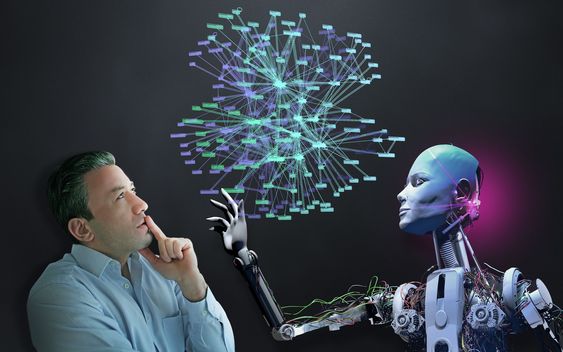Artificial intelligence (AI) is a broad field in computer science focused on creating smart machines capable of performing tasks that typically rely on human intelligence. Advancements in machine learning and deep learning are significantly transforming various tech sectors.
AI enables machines to emulate or enhance human cognitive abilities, advancing everything from self-driving cars to tools like ChatGPT and Google’s Bard. AI is growing immensely and becoming part of daily life, with companies across industries investing in this technology.
How does Artificial Intelligence AI Work?
AI functions by integrating vast datasets with fast, iterative processing and intelligent algorithms, enabling the software to learn from patterns or features in the data autonomously. This wide-ranging field of study includes several theories, methods, and technologies, including the following vital subfields:
- Machine Learning: It automates analytical model building using techniques from neural networks, statistics, operations research, and physics to discover unseen insights in data without explicit programming for specific inquiries.
- Neural Networks: A type of machine learning consists of interconnected units (resembling neurons) that process information by reacting to external inputs and relaying information among units. This iterative process uncovers connections and extracts meaning from undefined data.
- Deep Learning: It uses extensive neural networks with multiple layers of processing units, leveraging enhanced computing power and training techniques to discern intricate patterns in large datasets. Common applications include image and speech recognition.
Additionally, AI systems require computer vision, natural language processing, graphical processing units, the Internet of Things, advanced algorithms, and application programming interfaces.
Application of Artificial Intelligence Across Industries
AI has made its way into a wide variety of markets. Here are a few examples:
1.Retail:
- Personalized Marketing: AI analyzes customer data to provide targeted and customized shopping experiences.
- Inventory Management: Optimizes stock levels and predicts demand, reducing wastage.
2.Healthcare:
- Diagnosis and Treatment: AI aids in medical imaging analysis, helping to detect diseases and abnormalities.
- Drug Discovery: Accelerates drug development by analyzing vast datasets to identify potential compounds.
3.Manufacturing:
- Quality Control: AI systems inspect and identify defects in real time during manufacturing.
- Supply Chain Optimization: Predictive analytics and AI improve supply chain efficiency.
4.Finance:
- Fraud Detection: AI algorithms analyze patterns to detect and prevent fraudulent transactions.
- Algorithmic Trading: AI-driven algorithms make real-time trading decisions based on market trends.
5.Automotive:
- Autonomous Vehicles: AI powers self-driving cars, enhancing safety and navigation.
- Predictive Maintenance: AI analyzes sensor data to predict and prevent vehicle maintenance issues.
Artificial Intelligence Tools and Services
Here’s a brief overview of key advancements in Artificial Intelligence Services and Tools:
1.Transformers: Google pioneered a more efficient AI training process on commodity PCs with GPUs, leading to the development of transformers that automate various aspects of training AI on unlabelled data.
2.Hardware Optimization: Hardware vendors like Nvidia optimize microcode for parallel processing across multiple GPU cores. This, combined with faster hardware and more efficient AI algorithms, is significantly improving AI performance. Nvidia is working with all cloud center providers to make this accessible through various service models.
3.Generative Pre-trained Transformers (GPTs): The AI stack has evolved with vendors like OpenAI, Nvidia, Microsoft, and Google offering pre-trained transformers that can be fine-tuned for specific tasks at a reduced cost and time, enabling faster time-to-market and reducing risk.
4.AI Cloud Services: Leading cloud providers, including AWS, Google Cloud, Microsoft Azure, IBM, and Oracle, offer branded AI-as-a-service, streamlining data engineering, model development, and application deployment to overcome obstacles in integrating AI capabilities into new applications.
5.Cutting-edge AI Models as a Service: AI model developers like OpenAI and Nvidia provide cutting-edge models optimized for various tasks, available through cloud services. Several players offer customized models for specific industries and use cases, contributing to the widespread adoption of AI.
Benefits of Artificial Intelligence
- Enhanced Accuracy and Precision: AI significantly reduces human errors, ensuring high precision in outcomes. Decisions made by AI systems rely on past data and specific algorithms, minimizing the likelihood of mistakes when adequately programmed.
- Human Life Safety: AI mitigates risks to human lives by deploying robots for complex tasks. Tasks like bomb diffusion or deep-sea exploration, which pose significant risks to humans, can be handled efficiently by AI robots.
- 24/7 Availability: AI systems operate continuously without breaks, ensuring round-the-clock functionality. They excel at performing multiple tasks tirelessly, including tedious and repetitive ones.
- Digital Customer Service: Modern companies utilize AI-based digital assistants and chatbots to respond promptly to customer queries, enhancing user interaction and satisfaction.
- Unbiased Decision-Making: AI operates without emotions, providing practical and rational decision-making. AI doesn’t have any biased views, which ensures more accurate decision-making.
In Conclusion
Artificial Intelligence is a transformative technology that simulates human intelligence. It processes large datasets with smart algorithms, enabling machines to learn, adapt, and perform complex tasks. AI’s broad applications across diverse industries represent its potential to revolutionize various aspects of our daily lives.

